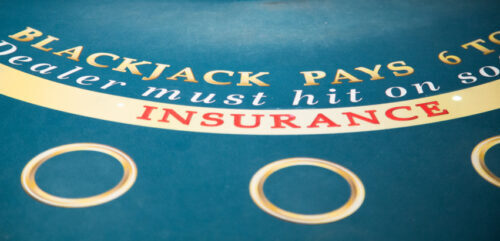What is insurance in blackjack?
If you’re a fairly new blackjack player, you may be wondering what blackjack insurance is, how it works, and whether it is worth taking. While some players feel that a blackjack insurance bet is worth the risk, not everyone agrees. Read on to find out more about insurance in blackjack and decide whether you want to include the insurance bet in your blackjack strategies.
What is insurance in blackjack?
When a casino offers insurance, blackjack players have the opportunity to place a separate side bet on their blackjack game. This is offered to the player if the dealer happens to deal themselves an ace as their up card (that is, the one that is face-up on the table). When the dealer’s up card is an ace, they are considered to be in a strong position, because if the other card is a 10, then the dealer will have blackjack, or ‘21’.
While there are no guarantees, cards with a face value of 10 are statistically common. This is simply because all the picture cards are worth 10, as well as the 10s themselves. There is close to a one-in-three chance, in fact, that the dealer’s other card is a 10, so at that point, an insurance bet can seem like a very good idea.
The insurance bet, then, is an extra bet that can be placed as insurance against the dealer’s hand being ‘blackjack’, which means, of course, that the dealer wins that hand.
How does an insurance bet work in blackjack?
Insurance in blackjack is offered when the dealer has their up card in front of them, but before the dealer checks their other card. The player can then decide to place the insurance bet if they so wish. After the player decides whether to take the insurance or not, the dealer reveals the card. If the dealer does in fact have 21, and the player took insurance, then the insurance bet pays out.
Blackjack insurance generally comes with odds of 2 to 1, with a maximum allowed bet usually set at half of the player’s main bet. The insurance bet potentially offers the player the chance to literally hedge their bets, and potentially break even, if the dealer’s other card is indeed a 10. The player can lose their main bet, but still win on their insurance bet.
When should you take insurance?
Blackjack insurance may sound like a good idea, but that isn’t always the case. In fact, many experienced players tend to avoid taking the insurance bet in blackjack. Sure, there’s an (almost) one-in-three chance that the dealer’s other card has a value of 10, but this still means that it’s more likely to be something else.
Even if it is just you against the dealer in a single-deck blackjack game, and even if you don’t have a 10 in your hand, the odds are still against the dealer at this point. Only 16 of the remaining 49 cards in the deck have a value of 10. So, the odds are still very much in favor of the dealer’s other card being something else.
This hand is also a best-case scenario situation. If there are other players in the game, or a lot of high-value cards have already been dealt, then the odds of the dealer getting a 10 are even lower.
If you are a good card counter and are aware that a lot of those 10s have already been dealt, then that’s a reason not to take the insurance bet. If you’ve been counting cards, however, and know that there are still mostly high-value cards in the deck, then you might want to take the insurance bet because you know that the odds are now starting to lean in the dealer’s favor.
The laws of probability suggest that the insurance bet is likely to be a losing bet the majority of the time. If, however, you’re a very capable card counter, you may have some information that makes you feel that taking the insurance bet is a worthwhile risk.
Remember to factor in your own hand. If you have a good one, then the odds of you winning the round are higher, even if you lose the insurance bet, so you’ll want to take that into account.
In short, you may want to take the insurance bet if:
- The dealer has an ace.
- You are pretty sure that there are lots of high cards left to deal.
- You have a good chance of winning with your own hand if you lose the insurance bet.
Don’t forget to consider the fact that blackjack is one of the games with the lowest house edge. It tends to be close to 50/50 whether you’ll win or lose anyway. So, any blackjack strategies you employ, including taking the insurance bet, will have very little impact on your overall winnings over the long term.
Blackjack insurance rules
The insurance bet in blackjack must be placed when the dealer’s up card is exposed, but before the dealer checks their other card. You can check your own cards before placing an insurance bet. The insurance bet is usually placed with an amount that is half your original wager, and it generally pays out at 2 to 1.
If the dealer draws a card with a value of 10 to go with their ace, and gets 21, then you have won the insurance bet. If they don’t, then you lose the insurance bet but can still win your main bet. Always find out what the rules are at the particular casino you’re playing at. It’s not unusual for casinos to impose their own extra rules, terms and conditions on any game or bet type, so always make sure that you understand exactly what it is you’re betting on.
When it comes down to it, blackjack is mostly a game of chance. There are strategies you can use to increase your odds of winning, and wise use of the insurance bet is one of them. However, there’s still a lot you can’t control, and whether you win any particular hand will come down to pure luck most of the time.
Comments
Comments are closed.





Pingback: How to Maximize Your Winnings in a Live Casino